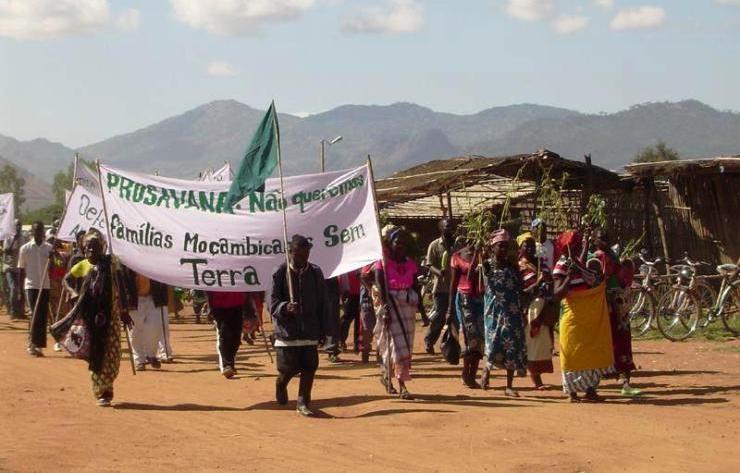The Voice of Communities in the Management of Natural Resources.

The management of a country’s natural resources depends exclusively on its government. In the case of mining and extractive activities such as gas or oil, it is important that governments ensure the correct processing of administrative and geological requirements that allow extractive activity.
In addition, governments need to ensure strict compliance with environmental regulations that protect ecosystems affected by extractive activities and that allow for optimal conditions for the development of the lives of people and communities.
In this context of exploitation of natural resources, the states also have the obligation to protect their citizens from all violation of human rights caused by foreign extractive companies in the exercise of their economic activity. Nothing can justify the concession of the land of the local communities, who are the legitimate owners of the land and whose main livelihood depends directly on the land to foreign companies that put their benefits before the well-being of the people.
Mining and extractive companies are always involved in controversies with the host communities. The economic power of the transnationals allows them to act with impunity even in the face of crimes committed in process of their economic activity.
It is difficult to bring Transnational corporations (TNCs) to court when international trade and investment treaties do not recognize the primacy of human rights over the economic interests of transnationals. Populations affected by extractive activities encounter innumerable obstacles to accessing justice and there are no legal mechanisms to protect those who report such behaviour. That is why must be extra vigilant in granting concession to mining and extractive companies.
If the authorization to mining operations remains with the governments, they must equally establish mechanisms to protect the interests of the local communities when the extractive companies show interest in certain areas that affect the population especially asserting their rights over the territories that legitimately belong to them.
The arrival of foreign investors to countries in the global south used to elicit a collective enthusiasm from local populations a few decades ago. The communities saw foreign companies as an opportunity to improve their living conditions and welcomed the promises of investors in exchange for the exploitation of the land. However, local populations now feel pained seeing how they have been cheated through decades of greedy exploitation of natural resources.
The abuse of power of TNCs has elicited disappointments among the population due to unfulfilled promises of economic compensation, non-compliance with international treaties and the systematic violation of human rights. Hence, in the face of the extractive fever we must encourage and support the communities to protect their lives, their territories, and their traditional ways of life.
The populations need to be informed about the specific wealth of the subsoil of their territories, the ways in which they are extracted, the techniques that are used and the risks that the extraction of minerals can cause to the population. In the face of the arrival of foreign investors, the communities need to be united to give a common response to the intention of starting an extractive activity and to report any attempt at bribery by the authorities or the companies themselves.
While states should be the first to protect and inform the public of what mining operations entail, sometimes we find states playing the opposite role, hiding information about the adverse effects of mining and being the first interested in bringing forward mining activities. Thus, the population must be informed and accompanied by independent experts of the civil society to discern their decisions to cede the use of the land.
It is a common practice for companies to offer to give economic aid to the population, jobs, and financial compensation for the loss of territory, however once the extractive exploitation begins, they are never carried out. Hence the importance of local communities having the support of independent legal advisers and civil society to enable them to exercise their rights in the event of opposition to the project or at least to help them enforce the promises offered by the companies and governments.
In recent years, extractive companies and investors have developed strategies to convince local communities of their acceptance of extractive activities in their territories. Governments, companies, and investors know that community support is essential to the success of their extractive projects, and they try to secure the backing of leaders.
However, these strategies are not accompanied by the implementation of the promises made by TNCs and the process of consultations to the affected communities becomes false hopes for the population,
which are never fulfilled.
The management of natural resources affect the directly fundamental rights of communities enormously because the protection for human life, the respect for cultural heritage received from the ancestors and aesthetic environment are jeopardized. However, the cases of killing human rights defenders and the harassment of indigenous communities fighting for their rights continue to grow every year.
It is for this reason that Africa Europe Faith and Justice Network (AEFJN) underlines the right of communities to say no to extractive exploitations as an expression of the right of peoples to manage their natural resources. In this vein it becomes imperative for the governments in Africa and Europe to get involved in the negotiations for a legally binding treaty; a treaty that imposes direct obligations to companies in their extractive activities but overall a treaty that protect traditional ways of life of indigenous communities and ancestral cultures linked to the land and the value of the sacred.
José Luis Gutiérrez Aranda,
Trade Policy Officer,
Africa Europe Faith and Justice Network (AEFJN)



